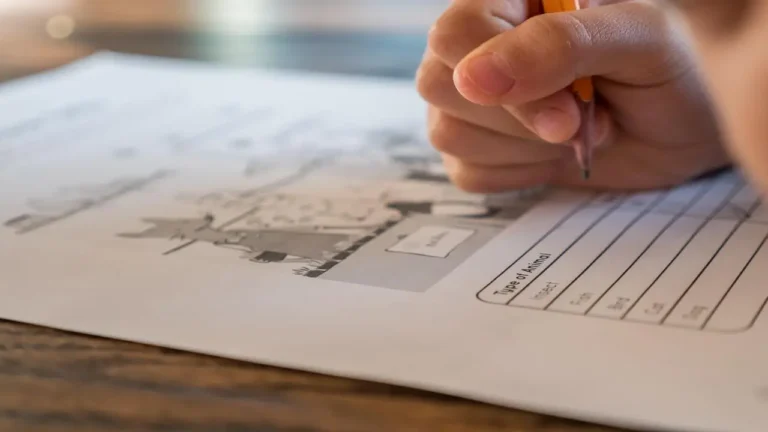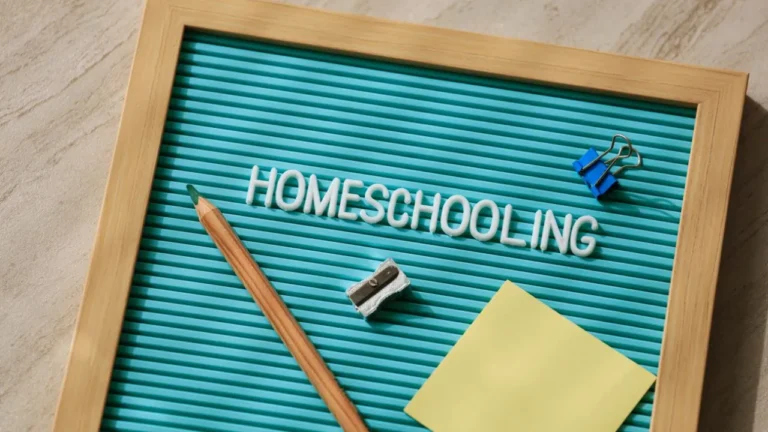Finding Your Balance in the Homework Help Maze

The nightly ordeal of homework—does it fill you with as much apprehension as it does your child? It’s a riddle that many of us parents grapple with: how involved should we get? You see, dive in too deeply and you might just suffocate their budding autonomy. Step back too far and you risk casting them adrift in a sea of algebraic expressions and Shakespearean verses. It’s a fine line, isn’t it?
So, what’s a parent to do? Today, I want to walk you through this labyrinth of choices and challenges. Let’s explore the tightrope act of parenting in the context of schoolwork. My aim is to help you navigate a balanced course—where your support is neither stifling nor sparse, but perfectly attuned to your child’s unique needs.
This isn’t just about academic excellence; it’s an exploration of how we can instill life skills like resilience, self-reliance, and emotional intelligence. Are you ready to embark on this journey with me?
Parental Involvement With Homework Help
Navigating the labyrinth of your child’s homework can feel like tiptoeing through a minefield, can’t it? On one hand, we want to cushion their struggles, and be their steadfast cheerleaders. On the other, there’s the gnawing worry that too much involvement will rob them of the valuable life skills of resilience and self-efficacy. This dance between aiding and abstaining—it’s a conundrum, one that we parents often find ourselves entangled in.
Fred Astaire once said, “The hardest job kids face today is learning good manners without seeing any.” Extend that wisdom to the realm of homework, and we arrive at a compelling inquiry: How can children learn the intricacies of responsibility and self-reliance if we, their role models, are forever swooping in to save the day?
I recall my own journey as a parent in this context, a story peppered with both triumphs and stumbling blocks. My daughter, at the tender age of nine, was grappling with a complex math problem. Her furrowed brow and clenched pencil spoke volumes.
My instinct? To guide her hand, quite literally, towards the solution. Yet, as her eyes met mine, I paused. I realized that my well-intentioned guidance could very well be a disservice. Was I nurturing her academic skills, or was I stunting her ability to confront and conquer challenges independently? In that moment, I chose restraint over rescue, a silent supporter rather than an active solver.
This dance of involvement and distance is more than a parenting strategy; it’s a life lesson in disguise. It’s about fostering the skills they will carry into adulthood: problem-solving, emotional resilience, and yes, the ability to sit with discomfort and uncertainty.
These are not just homework skills; these are life skills. So, as we venture further into the complexities of parent-child dynamics around schoolwork, let’s pause and ask ourselves: Are we really helping them, or are we setting them up for a tougher road ahead? It’s a question worth pondering, don’t you think?

Why Homework Matters
When the topic of homework surfaces, the discourse usually revolves around its academic benefits. But have you ever paused to contemplate the deeper essence of this seemingly mundane task? You see, I believe homework serves a dual purpose that transcends mere academics—it’s a crucible for character development.
Let’s pivot our perspective a bit. Beyond its role as a rehearsal for classroom lessons, homework functions as a silent tutor for life skills. It’s an arena where your child learns to negotiate deadlines, manage time, and build a work ethic. While a tutor can offer assistance with homework, the life lessons woven into the fabric of these assignments can only be self-taught.
Now, about those math problems and calculus equations your child dreads. Beyond the numbers and symbols lies a lesson in perseverance, in facing challenges head-on. Here, algebra isn’t just a subject; it’s a metaphor for life’s complex problems that demand critical thinking and innovative solutions.
Have you ever considered what the real value of homework is? It isn’t just about boosting GPAs or acing standardized tests. No, my friends, homework is a scaffold to maturity, a quiet guide ushering your child into the realm of responsibility, self-discipline, and even empathy.
How, you ask? Well, every time they tackle a difficult homework assignment, they’re not just learning about the subject matter. They’re also learning about their own capabilities and limitations, and how to navigate both.
So the next time you find yourself seeking the best homework help website or service for your child, remember: the ultimate help with homework comes from understanding its deeper purpose. This isn’t merely a chore to rush through, but a meaningful exercise designed to prepare them for the more complex assignments that life will inevitably hand them. Intriguing thought, isn’t it?
The Risks of Over-Helping
In the world of online homework help websites and apps that promise better grades and quick solutions, it’s tempting to become the ever-ready homework helper for your child. But here’s a pause-worthy question: Could this well-intentioned assistance be cultivating dependency rather than self-reliance?
I’ve encountered many parents who, with the best of intentions, hover over their child’s math problems and algebra equations like a guardian angel. But often, what we don’t realize is that this level of involvement can create a dependency that undermines the very educational process we’re aiming to bolster.
Remember, there’s a vast landscape between helping students and making the journey for them. As a real-life example, consider the child who never learned to do their laundry. Showered with the best homework help and step-by-step guidance in academics, this child may excel in calculus but flounder in the basic life skill of laundry. And that’s why we’ve got to consider the long-term ramifications.
There are countless homework help sites and even community of experts who can assist your child. But if we perpetually lead them to the answers they seek, aren’t we depriving them of the invaluable skill of finding solutions independently? In my years of experience, I’ve seen that students need to wrestle with their homework assignments, to experience the struggle before arriving at the ‘aha’ moment.
I’ve heard parents praise paid homework help services, but let’s not forget: Chegg’s, Khan Academy, and even Photomath can’t replace the life lessons that come with grappling with a complex assignment. Yes, these sites offer one-on-one tutoring and step-by-step explanations, but do they teach your child the art of resilience?
My point is simple: the help you need should empower, not enfeeble. When it comes to homework, it’s not about getting the answer; it’s about understanding the journey to that answer. So, the next time you find yourself thinking,
“I need to help my child with their science homework or essay writing,” take a moment to consider: Are you offering the help they genuinely need, or are you stepping in to make the journey easier for yourself? It’s a fine line and one that can influence not just their grades but their approach to life’s challenges.
The Downsides of Under-Helping
Amid the clamor for step-by-step solutions and one-on-one tutoring, have we considered the implications of stepping back too far? While we discuss the pitfalls of over-involvement, it’s equally important to address the consequences of under-helping. Let’s delve into this often-overlooked aspect, shall we?
Emotional intelligence is at the heart of learning. I’ve seen, time and again, how students suffer when they’re left to navigate the sea of educational challenges without a compass. Now, I’m not saying every homework assignment requires your intervention, but consider the emotional toll on a child who consistently finds themselves adrift. They might develop a negative relationship with learning—a devastating outcome that no textbook solution can fix.
Is hands-off always the best approach? The answer is far from straightforward. Too much distance and we risk turning educational videos and study tools into mere distractions. Yes, platforms like Photomath and SparkNotes offer a plethora of resources, but they’re hardly a substitute for a parent’s nuanced understanding of their child’s unique learning needs.
In today’s world, data analysis and spaced repetition are buzzwords. But let’s not forget the human element. Learning is not merely an accumulation of subject knowledge; it’s an emotional journey. A team of experts on a highly qualified homework help site may provide well-structured assignments, but they can’t offer the emotional nuance that you, as a parent, can.
Here’s something to ponder: In our quest to make homework easier, are we turning a blind eye to the practice exercises that come with struggle and eventual mastery? Every struggle allows students the opportunity to grow, to learn the concepts at a deeper level, something that a math solver app can’t provide.
So, don’t be too quick to submit bids to answer your child’s questions and get them the easy way out. Remember, the goal is to facilitate learning, not shortcut it.
The community of experts online can offer solutions, but can they interpret the hesitation in your child’s eyes or the slight slump of their shoulders? This is where experienced professionals and even the best online tutoring services fall short. Our role isn’t just about the on-time delivery of answers; it’s about understanding the emotional landscape that surrounds the learning process.
As we navigate this complex terrain, let’s keep asking ourselves: Are we doing justice to the educational and emotional facets of our child’s development? Let’s not just aim for better grades; let’s strive for a better, well-rounded learning experience.

Navigating the Middle Ground
So, we’ve explored the potential pitfalls of being overly involved or insufficiently present in our children’s homework journey. But isn’t there a middle ground, a sanctuary of balance where support doesn’t morph into spoon-feeding? Indeed, there is. That’s why we’ve arrived at this crucial juncture: navigating the delicate in-between. Let’s dive in, shall we?
Best Homework Help You Can Do Provide Balance
Homework Help: Steps to Create a Balanced Environment
So, the next time you find yourself caught in the web of whether to help or not, remember: balance isn’t about equidistance from two extremes; it’s about harmonizing them. Your role is to be a catalyst for their growth, not a crutch they lean on.
Are You Doing To Much? Maybe Get a Homework Helper
The subtle cues that often go unnoticed—yet they speak volumes. Are you attuned to these signs? Let’s delve into the signals that could indicate it’s time for a homework strategy reevaluation.
Table: Signs That You’re Either Helping Too Much or Too Little with Homework
| Symptom | Too Much Help | Too Little Help |
|---|---|---|
| Stress Levels | Skyrocketing tension; child seems overwhelmed. | Rising stress due to feeling unsupported. |
| Time Management | Child depends on you for on-time delivery of multiple assignments. | Missed deadlines and a backlog of tasks. |
| Independence | Child waits for step-by-step solutions and lacks problem-solving skills. | Appears lost; avoids asking for help. |
| Quality of Work | Assignments are well-structured but lack the child’s unique touch. | Work is disorganized and hurried. |
| Learning Outcomes | Subject knowledge is rote, not internalized. | Struggles with basic concepts and foundational knowledge. |
| Resource Usage | Over-reliance on educational videos and study tools, i.e., what Chegg offers. | Rarely uses available resources, including AP materials and what Studypool offers. |
| Emotional Signals | Anxious attachment; seeks constant validation. | Withdrawal and a lack of engagement. |
| Understanding of Material | Can execute but not explain mathematical concepts. | Struggles to grasp or apply what they’re really learning. |
Now, let’s get this straight: No one knows your child better than you do. As experienced professionals in child psychology and development will tell you, every child has a unique learning curve. In other words, everyone learns differently, and what works for one may not for another.
I encourage you to employ a method known as spaced repetition, which allows students to review and reinforce their learning. Encourage them to get personalized help that aligns with their learning style. This could range from a PH.D. mentor in a specific subject to advanced software that helps them manage their assignments.
The key takeaway? Be observant, be present, but also be willing to adapt. The signs are often there, subtle but significant. Your role isn’t just to help them get their homework done; it’s to guide them in becoming lifelong learners. So, as you navigate this intricate dance between involvement and independence, keep an eye out for these signs. They’re your compass in this journey of academic parenting.
The Virtue of Letting Go
Ernest Dimnet once said, “Children have to be educated, but they have also to be left to educate themselves.” A profound thought, isn’t it? How often have we paused to consider the long-term ramifications of our involvement—or lack thereof—in our children’s educational journey?
It’s not just about getting them the help they want or covering a variety of subjects. It’s about sculpting independent thinkers and problem solvers. I think the true essence of education is not merely to learn the material but to learn how to learn. This is where the virtue of letting go gains its utmost significance.
Imagine a life where your child, as an adult, can navigate challenges not just with the knowledge you’ve imparted but with the wisdom they’ve cultivated themselves. This is the ultimate goal, one that transcends the boundaries of school assignments and enters the realm of life skills.
You see, each time we step back and allow our children to struggle, to grapple with questions, and to find their way, we are indirectly strengthening their resilience. We offer them the chance to explore their capacities and, in doing so, discover their self-worth.
Don’t misunderstand me; being there to guide and support is crucial. Providing help for students when they’re genuinely stuck is imperative. But there’s a world of difference between being a guiding star and a crutch. The former illuminates the path; the latter inhibits the journey.
So, as you find yourself at the crossroads of involvement, ponder this: Are you imparting skills, or are you inhibiting self-reliance? Are you giving them fish, or are you teaching them how to fish? And most importantly, are you prepared to let go enough for them to discover their own ocean of possibilities?
It’s an intricate dance between holding on and letting go, one that evolves as your child grows. The art lies in knowing when to take a step back and let them lead. After all, isn’t the most impactful education the one where they are the protagonists of their own story?
Dare to let go. The rewards may not be immediate, but the long-term dividends in their character and capabilities will be immeasurable.
The Role of Schools and Teachers
In our quest for balance, let’s not overlook another pivotal actor in this intricate drama—the school and its educators. Ever pondered how teachers can either facilitate or hinder your efforts as a parent? Yes, the classroom is an extension of home—or at least it should be.
The Catalysts and Obstacles Teachers Pose
Teachers can be immensely supportive. Their role extends beyond the whiteboard and classrooms. They can help you learn the unspoken curriculum of emotional intelligence, character development, and life skills. It’s a partnership where teachers can provide insights that help you guide your child in a way that neither an online tutorial nor a how-to guide can.
But, let’s not gloss over the flip side. Teachers can also inadvertently contribute to the tension. When the focus shifts from learning to grading, the essence of education takes a backseat. “Help me with my homework” becomes a plea for survival, not a quest for knowledge. The classroom environment, in such cases, can turn into an arena where grades are the ultimate trophy, and the actual learning becomes secondary.
Call to Action: Forge a Partnership with Educators
So, what can you do? I believe the first step is proactive communication. Engage with teachers, learn their teaching philosophy, and discuss your child’s needs and challenges. The aim? To create a conducive environment for your child’s growth.
The essence of education is a collaborative effort involving parents, teachers, and students. It’s a delicate dance that requires steps, pauses, and sometimes even a change of direction from all parties involved.
So, reach out, forge connections, and let’s collectively steer our children toward a future where learning isn’t just a chore or a race for grades, but a lifelong adventure.
Final Thoughts…
As we come full circle in this discourse, let’s crystallize what we’ve unearthed. We’ve explored the labyrinth of dilemmas that parenthood often brings, particularly when it comes to academic support. The enigma of “how much is too much” and “how little is too little” is one that doesn’t come with a manual. We’ve delved into the role schools and teachers play in either amplifying or mitigating these complexities.
The journey to finding that elusive balance is laden with nuance. It’s not a one-size-fits-all scenario; it’s an ever-evolving, dynamic interplay between your child’s needs, your involvement, and the educational ecosystem. I think the real accomplishment here isn’t just ensuring your child excels academically; it’s in nurturing a self-reliant, curious, and emotionally intelligent individual.
So, as you navigate the educational odyssey with your child, remember this: The aim isn’t just to solve equations or dissect literary works. The true north is to instill a love for learning, encourage a questioning mind, and foster emotional and intellectual self-sufficiency. Finding the right balance in helping your child with homework isn’t just about academics; it’s a profound lesson in life skills and character building.
Your role, thus, extends beyond the walls of your home and the hours of homework. It’s a lifetime commitment to your child’s holistic well-being. Intriguing, isn’t it? So, the next time you’re faced with the plea, “Can you help me with my homework?”—you’ll know it’s not just about that math problem; it’s about preparing them for life itself.







